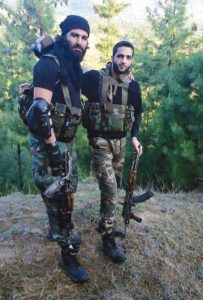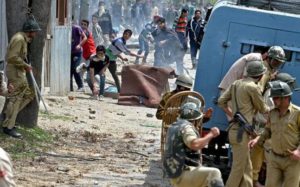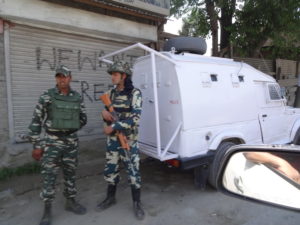Kashmir is ablaze yet again. This time, over the killing of a terrorist Sabzar Bhat from the Hizbul Mujahedeen by the Indian security forces. The Valley seems to have erupted in support of the slain mercenary. Protests broke out in southern Kashmir, especially in Tahab area of Pulwama, Anantnag, and Shopian. The turmoil that has been kicked up on Bhat’s death seems to be like deja vu, a replay, of the anarchy that had gripped the Valley last year when Burhan Wani, another Hizbul terrorist, was gunned down by Indian forces.
Bhat’s death seems to be like deja vu, a replay, of the anarchy that had gripped the Valley last year when Burhan Wani, another Hizbul terrorist, was gunned down by Indian forces.
 Bhat’s death seems to be like deja vu, a replay, of the anarchy that had gripped the Valley last year when Burhan Wani, another Hizbul terrorist, was gunned down by Indian forces.
Bhat’s death seems to be like deja vu, a replay, of the anarchy that had gripped the Valley last year when Burhan Wani, another Hizbul terrorist, was gunned down by Indian forces. So why is the northern-most region of India erupting in violence over the death of dreaded terrorists like Wani and Bhat? Why is that the populace in Kashmir more sympathetic to the cause of the radicals rather than those of nationals? Why is Kashmir burning? Why are the Kashmiris so thankless and so darn unpatriotic?
These are some of the basic queries that seem to crop up in the mind of the Indians across the mainland. Fuelled by jingoistic coverage of events on media, which almost borders on absurd, there seems to be an invisible wall that lies between Kashmir and India. We seem to be looking at each other through a coloured prism, unable to understand or comprehend.
What could be the reason for this disconnect? Do we really understand the problems that beleaguer Kashmir? Are we even aware?
A political issue or something more
The turmoil in Kashmir is often portrayed as an old issue, dating back to right when India attained independence from the British. The story of Kashmir and its accession to India is too well-known to require a repetition. But let me add that the wounds that were opened in ’47, have not healed or have not been allowed to heal by various elements within and beyond the borders.
 Meanwhile, back in mainland India, Kashmir is portrayed as a law and order problem, Pakistan is blamed for fanning the flames of violence, and so on. The common argument is that till 1989, weren’t the Kashmiris cohabiting with Indians happily, letting the Yash Chopras of the world shoot Bollywood movies in the charming locales. Now, if azaadi was not desirable till the 90s, how did the game change so drastically and dramatically? Why did the Shikara-driving or Kahwa-sipping Kashmiri suddenly develop political ambitions and such massive ones?
Meanwhile, back in mainland India, Kashmir is portrayed as a law and order problem, Pakistan is blamed for fanning the flames of violence, and so on. The common argument is that till 1989, weren’t the Kashmiris cohabiting with Indians happily, letting the Yash Chopras of the world shoot Bollywood movies in the charming locales. Now, if azaadi was not desirable till the 90s, how did the game change so drastically and dramatically? Why did the Shikara-driving or Kahwa-sipping Kashmiri suddenly develop political ambitions and such massive ones?In our allergy to the word azaadi, what we really fail to realise is that it quite widespread in the Valley. From the rich owner of the houseboat to the lowly Gujjar horseman, everyone would at some time or the other talk about the concept of azaadi in varying degree of rapture. Instead of retreating into our patriotic shell, we need to face up to the call for azaadi, asking aloud as to whom is this freedom sought from; the Indian state or the state of affairs in Kashmir?
Solving it with might
In the stirring poem, The Rime of the Ancient Mariner, Samuel Coleridge tells a tale of a ship caught in a storm in the Antarctic waters and is rescued by the appearance of an albatross that guides the ship to safety. One of the mariners on board shoots the bird and brings bad luck to the ship. As the ship gets stuck in the ocean, the crew blames the mariner for the ill-luck and hang the dead albatross around his neck, as a sort of punishment or reminder of his crime.
Metaphorically, Kashmir seems like an albatross around India’s neck. The difference is, it isn’t yet dead but gasping for air, mortally wounded. Like the mariner in the poem who killed the beautiful bird with a gun, we too seem to be doing so, with lot many guns and an amazing array of them (AK47s, pellets, rubber, tear-gas).
Kashmir is being strangulated by the very hands that are meant to save it. And no prizes for guessing; it is the Indian military.
The first striking thing that you notice the moment you step out of Sheikh-ul-Alam Airport in Srinagar is the sheer numbers of security forces on the street. All over the roads, the crossroads, the corners, the hillocks, the distance, the near, the shops, the roundabouts, the camps, the schools, the ATMs, everywhere that you see are men in fatigues armed with automatics. One gets a rather odd feeling at seeing such pervasive military presence. I mean, you kind of wonder, whether you have accidentally landed in Kabul or Baghdad instead of Srinagar.
the camps, the schools, the ATMs, everywhere that you see are men in fatigues armed with automatics. One gets a rather odd feeling at seeing such pervasive military presence. I mean, you kind of wonder, whether you have accidentally landed in Kabul or Baghdad instead of Srinagar.
 the camps, the schools, the ATMs, everywhere that you see are men in fatigues armed with automatics. One gets a rather odd feeling at seeing such pervasive military presence. I mean, you kind of wonder, whether you have accidentally landed in Kabul or Baghdad instead of Srinagar.
the camps, the schools, the ATMs, everywhere that you see are men in fatigues armed with automatics. One gets a rather odd feeling at seeing such pervasive military presence. I mean, you kind of wonder, whether you have accidentally landed in Kabul or Baghdad instead of Srinagar.Apparently, there’s a record in the Guinness Book as well that talks about Kashmir being the most militarised place on the planet. Figures vary from a few lakh to a couple of millions depending on bias behind the number. Nevertheless, even on a per capita Kashmiri basis, the sheer number of Indian military force is mind numbing.
